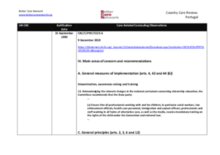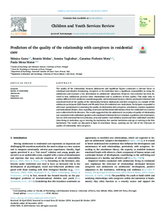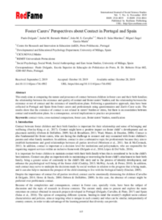Displaying 11 - 20 of 48
The objective of this study was to explore the effects of previous maltreatment on current self-representations (i.e., the attributes used to describe oneself) of youth in residential care and the moderating role of gender, age, number of previous placements and length of placement in residential care.
This study aims at comparing subjective well-being (SWB) of children in residential care and in foster families in two European territories or jurisdictions: Portugal and Catalonia (Spain).
The present study aims to identify the adoptee, parents and family related predictors of the adoptive parents' parenting stress, exploring direct and indirect effects. Fifty Portuguese adolescents' adoptive parents participated in this study.
This qualitative study, conducted in Portugal, aimed to understand professionals' perspectives on the collaborative processes between the Early Childhood Intervention (ECI) and the Child Protection Systems.
For this study, a sample of 365 adolescents in residential care settings in Portugal completed a set of self-reported measures, specifically, the Rights perceptions scale, the Place attachment scale and Scales of psychological well-being.
This country care review includes the care related Concluding Observations adopted by the Committee on the Rights of the Child and the Committee on the Rights of Persons with Disabilities.
This study aims to analyze different level predictors (sociodemographic and institutional history-related, emotional/relational and contextual level) of the quality of the relationship between adolescents and their caregivers, in a sample of 326 adolescent participants (228 female and 98 male) from 20 residential care institutions.
This study extends research on the effects of institutionalization—by examining the trajectories of cognitive, language and motor development of 64 Portuguese infants and toddlers across the first six months of institutionalization, while determining whether pre-institutional adversities and the stability and consistency of institutional care predict children’s development.
Join this webinar to walk through the PROMISE Child Participation Tool and to discuss approaches and considerations for soliciting children’s views on their Barnahus experience.
This study aims at comparing the nature and processes of contact between children in foster care and their birth families; the relationship between the existence and quality of contact and foster carers’ burden; and the relationship between the existence or not of contact and the existence of reunification plans.



